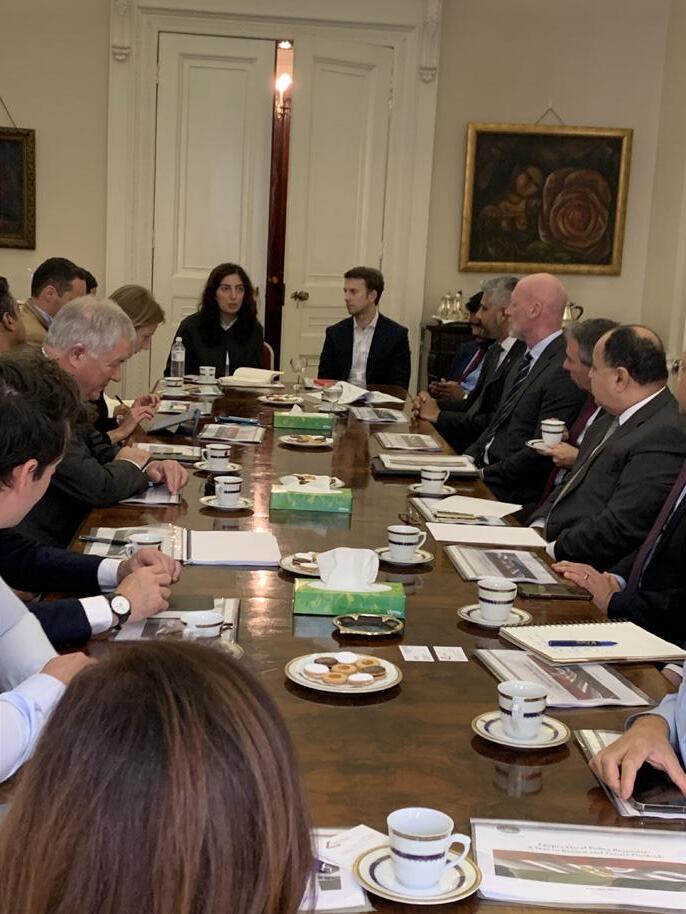
3 minute read
Visit Review: Breakfast Briefing with the Egyptian Minister of Finance
Speakers:
H.E. Dr. Mohamed Maait – Egyptian Minister of Finance
Rt. Honourable Sir Jeffrey Donaldson MP, UK Trade Envoy to Egypt & Cameroon & Leader of the Democratic Unionist Party
Moderator: Ian Gray OBE, Chairman – Egyptian British Chamber of Commerce
Sir Jeffrey Donaldson started his opening remarks, by paying tribute to the EBCC for maintaining interest in Egypt during the pandemic through webinars and informative events which was really important to bridge the gap and build bridges for trading connections.
Egypt has prospects in tackling climate change due to its strong sustainbility plans, however in combination with the Chamber’s outward mission in March more sectors also have great opportunities like healthcare, education and infrastructure. ‘The reform agenda which has been taken forward under the direction of President Sisi in recent years, has shown major improvement in the investment climate. The refrom agenda has very positive impact on investment and opportunities for making it easier to do business with Egypt and in Egypt Sir Jeffrey added.
H.E. Dr. Mohamed Maait, Egyptian Minister of Finance started his presentation ‘Egypt’s Fiscal Policy Response: A year in review and future outlook’ by looking at what Egypt has been through during and after COVID-19. H.E. Dr. Maait stated that the government tried to have a balanced approach in terms of safety measures to save lives and making sure the economy kept moving, the government was keen to support vunerable sectors while trying to reduce the negative impact on people’s income.
The Key pillars for government response were:
• Policies to maintain macroeconomic stability: The government tried to sustain its fiscal and debt position by mobilising additional pro -growth revenue
• Supportive and Targeted measure worth 2% of GDP: The government provided support to the most vulnerable sectors including Tourism, aviation and exporters.
• Secured adequate financing: The government was able to secure adequate financing with two programs Rapid Financing Instrument (RFI) and 12-month Stand By Agreement (SBA) through the IMF at the onset of COVID-19. The government has also issued Green bonds worth $750 million to diversify its investor base.
The government is also supporting its people in dealing with the impact of COVID-19 with the biggest program in the history of Egyptians yet ‘Hayah Karima’ or ‘Decent Life’ aimed at improving more than 60 million Egyptians living standards in the poorest rural areas with a budget of over $50 billion over the next 3-4 years. The program aims at developing basic infrastructure needs in all these villages investing in healthcare, education, and water sanitization.
Egypt was one of the few countries in the world to have growth during the pandemic with a rate of 3.6% while keeping its rating from three different international rating agencies. Egypt also got a positive review from the IMF, European Bank, and the World Bank, which was reflected in a positive employment rate. The government aims to achieve a sustainable growth of more than 6% growth rate in the next few years.
Egypt was successful in bringing down deficit even during COVID-19 which declined from 12.5% in 2015/16 to 7.4% in 2020/21 and the target for this year is to reduce further to be 6.7%.

For the new financial year, Egypt has three main objectives:

• Ensure fiscal & debt sustainability: the overall budget deficit to decrease by 6.7% of GDP while increasing the primary surplus to 1.5% and the target is to reach 2% in the next two years
• Improve efficiency of revenues & expenditures: The government aims to keep annual growth up to 20% and annual expenditure around
• 10%. The revenue growth can be achieved through reducing the gap in tax collection. Egypt has a huge informal sector up to 55% who are not tax registered. The introduction of E-receipt will aim to encourage automation and be able to monitor trade
• Support high jobs rich economic growth: To provide adequate job creation to reduce unemployment rate and create adequate jobs
H.E. Dr. Maait concluded that although there are challenges that face the whole world due to the pandemic and its effects on the economy; however, Egypt is on track with its economic plans and will ensure sustainability of growth. Egypt has huge opportunities that will soon open new markets with neighbouring countries. Foreign investors have current and pipeline opportunities to do business with Egypt in several sectors, whether in education, renewable energy, oil or healthcare.
Following the Breakfast Briefing the EBCC organised three roundtable meetings with British investors for H.E. Dr. Maait where he discussed investment opportunities in Egypt in the field of sustainability and renewable energy as well as education, healthcare, and infrastructure.












